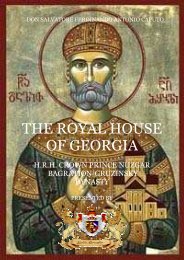here - Nobility Associations
here - Nobility Associations
here - Nobility Associations
You also want an ePaper? Increase the reach of your titles
YUMPU automatically turns print PDFs into web optimized ePapers that Google loves.
This single event led to the massacre of four thousand Frenchmen over the course<br />
of the next six weeks. The king of Sicily at the time, Charles I, was an Angevin, and<br />
his French followers had a legacy of mistreating the native people of Sicily,<br />
especially while Charles was away on one of his many absences. Only a few officials<br />
notable for their good conduct were spared; and the city of Messina held out for<br />
Charles. But through the diplomatic errors of the vicar, Herbert of Orléans,<br />
Messina revolted on April 28. Herbert retreated to the castle of Mategriffon and the<br />
Crusader fleet stationed in the harbor was burned.<br />
The church of the Holy Spirit in Palermo.<br />
The event takes its name from an insurrection which began at the start of Vespers,<br />
the sunset prayer marking the beginning of the night vigil on Easter Monday,<br />
March 30, 1282, at the Church of the Holy Spirit just outside Palermo. Because the<br />
city's borders have expanded over the centuries, the church is now within the city<br />
limits. Beginning on the night of the Vespers, thousands of Sicily's French<br />
inhabitants were massacred within six weeks. The events that started the uprising<br />
are not known for certain, but the various retellings have common elements. Only a<br />
small village called Sperlinga protected French soldiers in a castle excavated in<br />
sandstone.<br />
According to Steven Runciman, in Sicily was (and still is) a custom to celebrate<br />
with a picnic the day after Easter. That day is called Pasquetta (Little Easter). In<br />
that day people swarm to the countryside with baskets full of food and drinks to<br />
have a good time, the Sicilians at the church were engaged in holiday festivities and<br />
a group of French officials came by to join in and began to drink. To the Sicilians<br />
was forbidden to bear arms, while the French went always armed. A sergeant<br />
named Drouet dragged a young married woman from the crowd, pestering her with<br />
his advances. Her husband then attacked Drouet with a knife, killing him. When<br />
the other Frenchmen tried to avenge their comrade the Sicilian crowd fell upon<br />
them, killing them all. At that moment all the church bells in Palermo began to ring<br />
for Vespers. Runciman best describes the mood of the night:<br />
“To the sound of the bells messengers ran through the city calling on the men of<br />
Palermo to rise against the oppressor. At once the streets were filled with angry<br />
armed men, crying "Death to the French" ('Moranu li Francisi' in the Sicilian<br />
language). Every Frenchman they met was struck down. They poured into the<br />
inns frequented by the French and the houses w<strong>here</strong> they dwelt, sparing neither<br />
man, woman nor child. Sicilian girls who had married Frenchmen perished with<br />
their husbands. The rioters broke into the Dominican and Franciscan convents;<br />
and all the foreign friars were dragged out and told to pronounce the word<br />
'ciciri', whose sound the French tongue could never accurately reproduce. Anyone<br />
The Hohenstaufen Dynasty - Page 155 of 200



